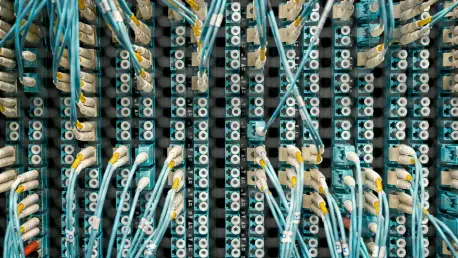Setting the Stage for a Connectivity Revolution
Imagine a Thailand where seamless 4G and 5G connectivity powers every corner of daily life, from bustling urban centers to remote rural areas, driving economic growth and digital inclusion across the nation. This vision is becoming a reality as True Corporation and DTAC, two titans of the Thai telecom sector, have completed a monumental network integration. Dubbed the “One Network” project, this initiative marks a turning point for the industry, reshaping competitive landscapes and setting new benchmarks for service quality in the ASEAN region. The significance of this merger, finalized over two years after the initial consolidation, lies in its promise to enhance user experiences while addressing critical market challenges like spectrum scarcity and operational inefficiencies.
This market analysis delves into the far-reaching implications of the True-DTAC integration, exploring how it influences current trends and forecasts future trajectories for Thailand’s telecommunications sector. By examining technological advancements, customer impacts, and sustainability efforts, the focus is on understanding how this milestone positions Thailand as a leader in network modernization. Stakeholders across the industry stand to gain insights into strategic opportunities and potential risks as digital connectivity continues to evolve.
Unpacking Market Trends and Strategic Impacts
Technological Leap: Innovations Fueling Growth
The Thai telecom market is witnessing a technological renaissance with the True-DTAC integration, which has introduced cutting-edge solutions to meet soaring data demands. Central to this transformation is the deployment of Dynamic Spectrum Sharing (DSS) technology, enabling flexible use of the 2600MHz spectrum for both 4G and 5G services. First implemented in Bangkok’s Thonglor district, this innovation optimizes resource allocation, ensuring smoother transitions between network generations. The scale of this project is staggering, with over 3,650 engineers dedicating millions of man-hours to upgrade infrastructure nationwide, reflecting a strong commitment to enhancing network performance.
Beyond DSS, the integration leverages newly acquired spectrum bands like the 1500MHz for improved stability and broader coverage. This strategic pooling of assets addresses long-standing issues of spectrum inefficiency, a common bottleneck in the ASEAN telecom space. However, scaling such advanced technologies to less accessible rural regions poses financial and logistical hurdles, signaling a need for continued investment and innovation to maintain market momentum.
Customer-Centric Outcomes: Redefining Service Standards
From a market perspective, the integration’s impact on end-users is a key driver of competitive advantage. DTAC customers have experienced a remarkable 4.9-fold increase in 5G speeds on the 2600MHz band, while True users report a 1.9-fold improvement, setting a new standard for data performance in Thailand. Enhanced 4G efficiency on the 2300MHz band further complements these gains, ensuring consistent connectivity even in high-traffic areas. Such improvements position True Corporation as a frontrunner in customer satisfaction, a critical metric in a market where user loyalty hinges on speed and reliability.
Comparative analysis with other ASEAN countries reveals Thailand’s accelerated progress in network upgrades, though risks like potential service interruptions during further expansions remain a concern. The ability to deliver superior digital experiences through spectrum consolidation offers a compelling value proposition, likely influencing customer retention and acquisition rates. This trend underscores a broader shift toward data-driven service models, where operators must prioritize user needs to stay relevant.
Sustainability as a Market Differentiator
Sustainability is emerging as a pivotal factor in shaping telecom market dynamics, and the One Network project exemplifies this shift. By dismantling redundant towers and integrating AI and machine learning for power optimization, True Corporation projects a 10% to 20% reduction in carbon emissions, aligning with its net-zero target by 2030. This focus on environmental responsibility resonates with growing consumer and regulatory expectations for green practices, providing a competitive edge in an industry often criticized for high energy consumption.
The initiative also highlights a regional trend where operators balance innovation with ecological accountability, though high initial costs for sustainable technologies present barriers to widespread adoption. Partnerships with global tech firms have been instrumental in achieving these outcomes, demonstrating that large-scale projects can prioritize environmental goals without compromising efficiency. This approach could redefine market standards, encouraging competitors to adopt similar strategies to meet evolving stakeholder demands.
Future Projections: Navigating Opportunities and Challenges
Looking ahead, the True-DTAC integration signals a transformative wave of network modernization across the ASEAN telecom market, with Thailand at the forefront. Projections indicate a surge in 5G adoption, fueled by increased spectrum availability and AI-driven network management, which could drive data consumption growth by double digits annually through 2027. Regulatory frameworks may also evolve, potentially introducing stricter sustainability mandates or revised spectrum allocation policies, shaping how operators plan expansions.
Economic disparities within the region might temper the pace of similar consolidations elsewhere, as smaller markets grapple with funding constraints. Nevertheless, Thailand’s success offers a blueprint for leveraging mergers to optimize resources, suggesting that strategic alliances could become a dominant trend. Market players must remain agile, adapting to technological disruptions and consumer expectations to capitalize on these emerging opportunities.
Reflecting on a Game-Changing Milestone
Looking back, the completion of the True-DTAC network integration stood as a defining moment for Thailand’s telecommunications landscape, highlighting the power of collaboration and innovation in addressing market challenges. The substantial gains in 4G and 5G performance, coupled with meaningful strides in sustainability, underscored the potential for strategic mergers to elevate industry standards. For stakeholders, the journey offered valuable lessons in balancing technological advancement with environmental responsibility.
Moving forward, telecom operators are encouraged to explore scalable solutions like DSS and invest in partnerships that amplify operational efficiencies. Prioritizing rural connectivity emerges as a critical next step to ensure inclusive growth, while continuous monitoring of regulatory shifts is deemed essential for strategic planning. The path ahead promises further transformation, with Thailand’s model serving as an inspiration for regional markets aiming to navigate the complexities of a digital-first era.









